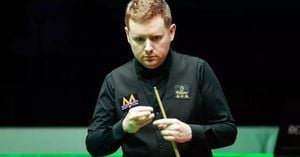At the upcoming 2024 Paris Olympics, the Refugee Olympic Team, commonly known by its French acronym EOR (Équipe Olympique des Réfugiés), is capturing global attention. For many, this team represents not only athletic prowess but also the resilience and hope of individuals who have had to flee their home countries due to violence, persecution, and conflict.
Established by the International Olympic Committee (IOC) back in 2016, the Refugee Olympic Team is making its third appearance this summer, showcasing 37 athletes from various countries around the world. This year’s competition invites these exceptional refugees to participate across 12 different sports, continuing the tradition of providing representation and visibility for those who often feel sidelined.
The significance of the EOR team extends beyond mere competition. It acts as both inspiration and advocacy, shedding light on the growing global crisis of displacement, which is currently affecting over 120 million individuals worldwide. “While the Olympic Games will draw everyone’s attention and we hope reach people’s hearts and minds,” said Jojo Ferris of the Olympic Refugee Foundation, “the team is here to help people understand the positive contribution refugees make to communities and society.”
Among the standout athletes of this year's EOR team is Cindy Ngamba, a boxer from Cameroon who has already garnered attention for her potential to secure the team’s first-ever Olympic medal. This marks her first Olympic appearance, alongside athletes from countries like Afghanistan, Syria, and Iran, each with their own heartbreaking stories of conflict and perseverance.
When the EOR was first introduced, it featured only 10 athletes (from countries such as Ethiopia, South Sudan, Syria, and the Democratic Republic of Congo) during the 2016 Rio Olympics. Since then, the number of competing athletes has steadily grown, highlighting the ever-expanding struggle of displaced people worldwide. This growth underscores the IOC's commitment to celebrating diversity and fostering inclusivity on the global stage.
Hailing from 11 different countries this year, the cultural backgrounds of these athletes reflect the complex narratives surrounding global displacement. Many among them have sought refuge and are now stable enough to showcase their talents on this tremendous platform. For example, some athletes fled their homes due to civil war, such as the case of those coming from Syria and Afghanistan, where instability has ravaged many lives.
The unifying theme of the EOR is the message of solidarity and hope. “Our team stands for the idea of sports uniting people,” shared Masomah Ali Zada, a member of the EOR. This conviction is not simply about medals or glory but about elevational voices and stories intertwined with loss, survival, and strength.
Each competitor has faced significant barriers to reaching the games. For some, the harrowing escape from their homeland resulted in life-altering experiences, as they navigated through treacherous conditions. The EOR is not just about athletic talent; it's about overcoming adversity—a commonality many refugees share.
Another significant aspect of the EOR's role has been its ability to challenge common misconceptions about refugees. According to Thomas Bach, the IOC President, the EOR serves as “a great signal about what enrichment refugees are for our Olympic community and for society at large.” This sentiment aims to shift the prevalent narrative surrounding refugees meant to elicit empathy rather than fear. The showcasing of their accomplishments on such a revered global stage like the Olympics aims to initiate dialogues on the positive impacts these individuals bring to their adopted communities.
While the Refugee Olympic Team continues to strive for democratic representation at the Olympics, it has also faced some obstacles. Recently, there has been controversy surrounding the inclusion of some athletes, leading to political outcries from various Caribbean and Central American nations. The Cuban Olympic Committee has even gone so far as to demand the removal of certain athletes who have criticized their home country's political regime.
The athletes represent both visible bravery and public rejection of oppression. The discussions surrounding their participation reveal the tension between sport and politics, often complicated by personal narratives of those involved.
Overall, the upcoming Olympic Games will showcase not just athletic excellence but the genealogical stories of strength, hope, and resilience among refugees. Rather than focusing solely on the goal of winning medals, what truly stands out is the representation of countless individuals whose stories are often overlooked. By providing these athletes with the opportunity to compete on the international stage, the IOC hopes to inspire both their athlete peers and the global audience watching from home.
Looking forward to the games, the presence of the EOR team fosters hope for the future, proving to all who watch, from casual sports fans to dedicated supporters of athletes, the value of inclusion. Perhaps, as the athletes take to the field, the world will not only witness their remarkable skills but also develop greater empathy for the plight of millions of displaced people striving for acceptance and recognition around the globe.
With every competition, the Refugee Olympic Team reminds us of the human spirit's resilience and the need for solidarity among diverse cultures and histories. Eager fans and supportive allies will undoubtedly cheer for these athletes as they march under the Olympic flag, showcasing their potential and fortitude at the Paris 2024 Games.



